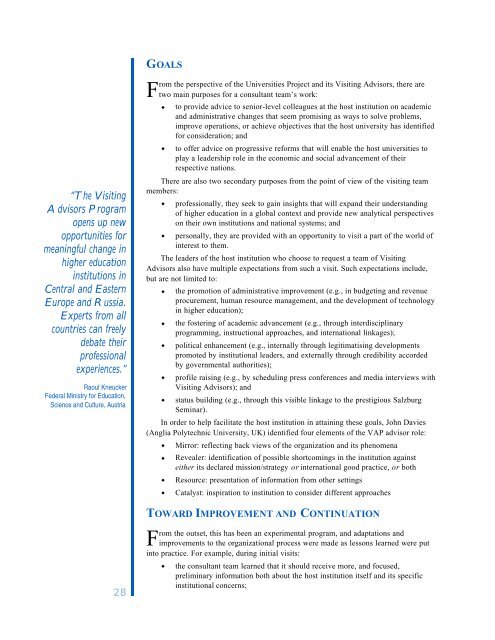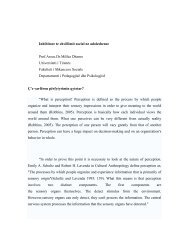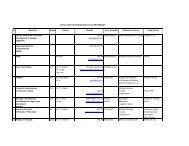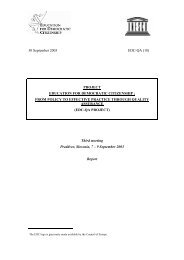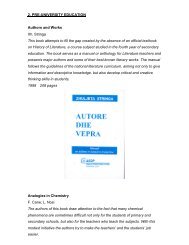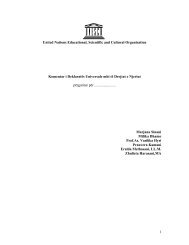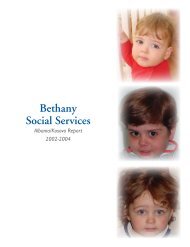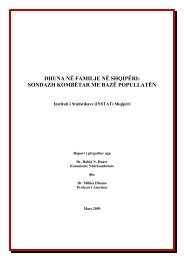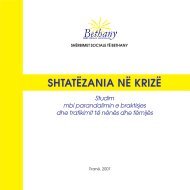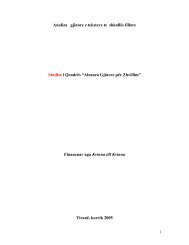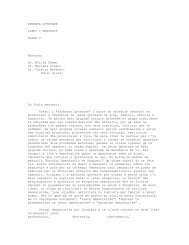Salzburg Seminar â Universities Project - Milika Dhamo
Salzburg Seminar â Universities Project - Milika Dhamo
Salzburg Seminar â Universities Project - Milika Dhamo
You also want an ePaper? Increase the reach of your titles
YUMPU automatically turns print PDFs into web optimized ePapers that Google loves.
“The Visiting<br />
Advisors Program<br />
opens up new<br />
opportunities for<br />
meaningful change in<br />
higher education<br />
institutions in<br />
Central and Eastern<br />
Europe and Russia.<br />
Experts from all<br />
countries can freely<br />
debate their<br />
professional<br />
experiences.”<br />
Raoul Kneucker<br />
Federal Ministry for Education,<br />
Science and Culture, Austria<br />
28<br />
GOALS<br />
From the perspective of the <strong>Universities</strong> <strong>Project</strong> and its Visiting Advisors, there are<br />
two main purposes for a consultant team’s work:<br />
• to provide advice to senior-level colleagues at the host institution on academic<br />
and administrative changes that seem promising as ways to solve problems,<br />
improve operations, or achieve objectives that the host university has identified<br />
for consideration; and<br />
• to offer advice on progressive reforms that will enable the host universities to<br />
play a leadership role in the economic and social advancement of their<br />
respective nations.<br />
There are also two secondary purposes from the point of view of the visiting team<br />
members:<br />
• professionally, they seek to gain insights that will expand their understanding<br />
of higher education in a global context and provide new analytical perspectives<br />
on their own institutions and national systems; and<br />
• personally, they are provided with an opportunity to visit a part of the world of<br />
interest to them.<br />
The leaders of the host institution who choose to request a team of Visiting<br />
Advisors also have multiple expectations from such a visit. Such expectations include,<br />
but are not limited to:<br />
• the promotion of administrative improvement (e.g., in budgeting and revenue<br />
procurement, human resource management, and the development of technology<br />
in higher education);<br />
• the fostering of academic advancement (e.g., through interdisciplinary<br />
programming, instructional approaches, and international linkages);<br />
• political enhancement (e.g., internally through legitimatising developments<br />
promoted by institutional leaders, and externally through credibility accorded<br />
by governmental authorities);<br />
• profile raising (e.g., by scheduling press conferences and media interviews with<br />
Visiting Advisors); and<br />
• status building (e.g., through this visible linkage to the prestigious <strong>Salzburg</strong><br />
<strong>Seminar</strong>).<br />
In order to help facilitate the host institution in attaining these goals, John Davies<br />
(Anglia Polytechnic University, UK) identified four elements of the VAP advisor role:<br />
• Mirror: reflecting back views of the organization and its phenomena<br />
• Revealer: identification of possible shortcomings in the institution against<br />
either its declared mission/strategy or international good practice, or both<br />
• Resource: presentation of information from other settings<br />
• Catalyst: inspiration to institution to consider different approaches<br />
TOWARD IMPROVEMENT AND CONTINUATION<br />
From the outset, this has been an experimental program, and adaptations and<br />
improvements to the organizational process were made as lessons learned were put<br />
into practice. For example, during initial visits:<br />
• the consultant team learned that it should receive more, and focused,<br />
preliminary information both about the host institution itself and its specific<br />
institutional concerns;


